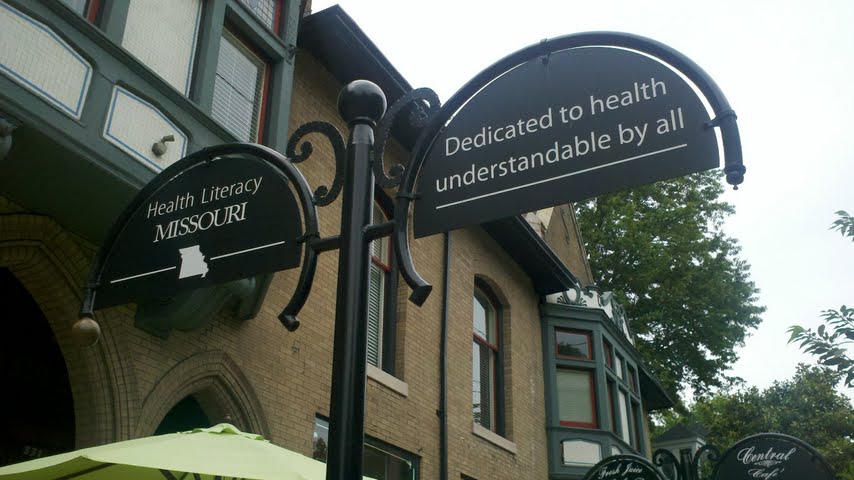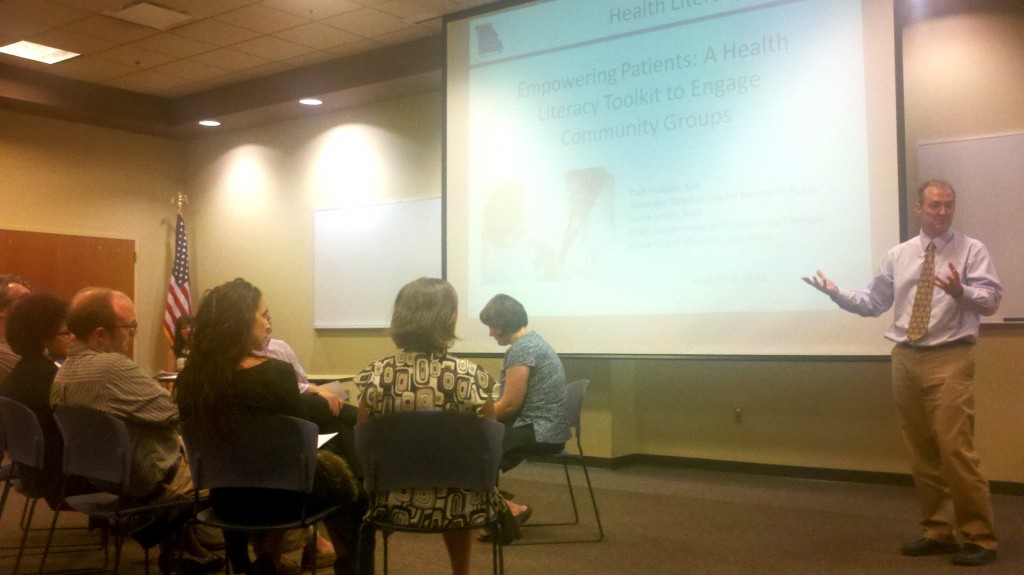 I’m visiting yesterday and today with some marvelous kindred spirits: Health Literacy Missouri (Twitter @HealthLitMo, Facebook). Their thoughts are very aligned with participatory medicine. It’s like we’ve been ships in the night – not crossing in the night, but sailing in parallel. And now we meet.
I’m visiting yesterday and today with some marvelous kindred spirits: Health Literacy Missouri (Twitter @HealthLitMo, Facebook). Their thoughts are very aligned with participatory medicine. It’s like we’ve been ships in the night – not crossing in the night, but sailing in parallel. And now we meet.
They’re a small non-profit in St. Louis, just 18 months old, and they’re doing rock’em sock’em great work at developing what I think is a key part of participatory medicine: patients’ comprehension of relevant health information, and their competence at doing their part in a participatory relationship.
For instance, here’s a (poor cell phone) snapshot from a great training they did this morning to introduce the new “Straight Talk With Your Doc”© patient instructions they’re working on:
 It was taken during a “train the trainer” role play – a doctor and patient in an appointment, with a small group huddled around, observing and discussing. The doc was speaking a bit rapidly and in ordinary doctor-speak – a bit over the head of many patients. The patient (without any training!) was responding, empowered: “Could you slow down? I want to understand.” “Will I be on this medication forever?” etc. The slide says “Empowering Patients: A Health Literacy Toolkit to Engage Community Groups.”
It was taken during a “train the trainer” role play – a doctor and patient in an appointment, with a small group huddled around, observing and discussing. The doc was speaking a bit rapidly and in ordinary doctor-speak – a bit over the head of many patients. The patient (without any training!) was responding, empowered: “Could you slow down? I want to understand.” “Will I be on this medication forever?” etc. The slide says “Empowering Patients: A Health Literacy Toolkit to Engage Community Groups.”
I love what I’ve seen so far of “Straight Talk With Your Doc.” Even the brochure about it is extraordinarily clear in its writing. “Clear” doesn’t mean dumbed-down – it’s just plain good writing, good use of language, just plain competent.
And clarity is essential if we want to put knowledge – power and responsibility – in the hands of patients and families.
Gaps and Overlaps: Participatory Medicine and Health Literacy
One thing we’re exploring here is that our movements have a lot in common – empowering, enabling and educating patients so they can be engaged in their care. But they’re different: their Wikipedia page defines health literacy as “an individual’s ability to read, understand and use healthcare information” (that’s my idea of literacy), but continues “… to make decisions and follow instructions for treatment.” Aha: they include shared decision making (about which we’ve blogged), but beyond that it’s about “compliance” – following instructions.
In contrast, participatory medicine (Wikipedia) emphasizes networked patients as drivers of their health. Clearly such patients need health literacy as part of their skills, so everything HLM is doing is relevant to participatory medicine; and, there are differences. Here’s hoping we do more together!






Dave, this is awesome news! As one of the SPM members who is looking forward to working on the education/training group, I’m all for collaboration.
How can we get a copy of their brochure and an introduction?
Hi Jonena,
Thanks for your interest in our organization. We’re excited to learn more from the SPM group as well. Shoot me an e-mail at swelch@healthliteracymissouri.org and we can set up a time to talk.
Dave,
A hugely under-developed partnership that can drive both agendas..
FYI, the National Action Plan to Improve Health Literacy includes some statements on health IT, below:
http://www.health.gov/communication/hlactionplan/pdf/Health_Literacy_Action_Plan.pdf
■ Use patient-centered technologies at all stages of the health care process to support the information and decisionmaking needs of patients
■ Use technology, including social media, to expand patients’ access to the health care team and information
I think the National Library of Medicine should powerfully connect their Literacy “arm”
http://nnlm.gov/outreach/consumer/hlthlit.html
with their Informatics “arm”.
The health literacy field (you can sign up for their listerv on the NLM site above) has a limited view of consumer informatics as a tool; as well, the informatics field could learn much from understanding more about health literacy. (Good example: the term “electronic health record”. Lots of meaning for professionals, little for consumers/patients…)
Hi Sarah,
I sent you an email request for 2 times to meet. Looking forward to the call.
Jonena
As America moves forward with Accountable Care, stakeholders everywhere will become more concerned with what works and what’s worth the cost.